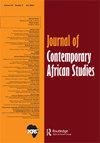合作与冲突之间:1973-2014年后殖民时期斯瓦蒂尼劳工与民主政治的互动模式
IF 0.8
Q2 AREA STUDIES
引用次数: 0
摘要
在多党制民主结束近五十年后,斯威士兰(原斯威士兰)正经历着越来越多的对再民主化的支持。本文探讨了后殖民时期斯瓦蒂尼劳工运动与民主政治力量之间的互动模式。劳工和民主力量之间的关系经历了合作和冲突,应该从多个特定背景因素的角度来分析。许多工人意识到,在传统君主制的专制统治下,他们的福利不会得到改善。然而,在1973年至2014年间,没有证据表明工人团结一致地支持民主议程。工人们经常走上街头,表达他们对恶劣的生活和工作条件的不满,工人运动内外的亲民主力量也能够挺身而出,争取对多党民主的支持。尽管如此,许多工人还是支持那些主要关注经济而非政治事务的工会。本文章由计算机程序翻译,如有差异,请以英文原文为准。
Between collaboration and conflict: patterns of interaction between labour and pro-democracy politics in post-colonial Eswatini, 1973–2014
ABSTRACT Nearly five decades after the end of multi-party democracy, Eswatini (formerly Swaziland) is experiencing growing support for re-democratisation. This article explores the patterns of interaction between the labour movement and pro-democracy political forces in post-colonial Eswatini. The relationship between labour and pro-democracy forces has gone through both collaboration and conflict, and should be analysed in terms of multiple context-specific factors. Many workers realised that their welfare would not improve under the authoritarian rule of the traditional monarchy. However, between 1973 and 2014, there is no evidence of unified workers’ support for a pro-democracy agenda. Workers regularly took to the street to manifest their discontent with appalling living and working conditions, and pro-democracy forces both within and outside the labour movement, were able to rise to the occasion to rally support for multi-party democracy. Despite this, many workers favoured trade unions that focused primarily on economic, rather than political matters.
求助全文
通过发布文献求助,成功后即可免费获取论文全文。
去求助
来源期刊

Journal of Contemporary African Studies
AREA STUDIES-
CiteScore
2.20
自引率
0.00%
发文量
18
期刊介绍:
Journal of Contemporary African Studies (JCAS) is an interdisciplinary journal seeking to promote an African-centred scholarly understanding of societies on the continent and their location within the global political economy. Its scope extends across a wide range of social science and humanities disciplines with topics covered including, but not limited to, culture, development, education, environmental questions, gender, government, labour, land, leadership, political economy politics, social movements, sociology of knowledge and welfare. JCAS welcomes contributions reviewing general trends in the academic literature with a specific focus on debates and developments in Africa as part of a broader aim of contributing towards the development of viable communities of African scholarship. The journal publishes original research articles, book reviews, notes from the field, debates, research reports and occasional review essays. It also publishes special issues and welcomes proposals for new topics. JCAS is published four times a year, in January, April, July and October.
 求助内容:
求助内容: 应助结果提醒方式:
应助结果提醒方式:


